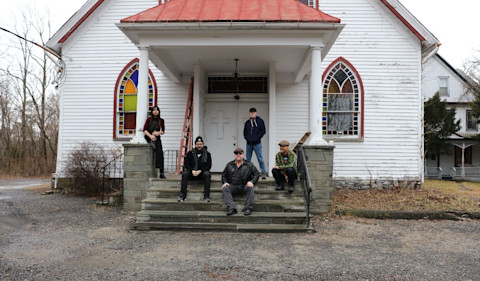"A millimeter will become a canyon to you," says Cate le Bon. "It's a real lesson in patience and precision." But even though the Welsh singer and multi-instrumentalist has been a highly regarded singer/songwriter for the better part of a decade, she isn't talking about the process of making music. She's talking about woodworking.
After her 2016 album Crab Day, le Bon felt a need to shake things up. "I'd been in a cycle of recording and touring relentlessly for about six or seven years," she says. "In between solo records, instead of taking a break, I'd do a record with Tim Presley [a.k.a. White Fence] under the moniker Drinks, so there was never really a break. I developed this fractious relationship with music; it was just omnipresent in a way that was kind of overwhelming."
A little space, a lot of inspiration
Le Bon responded by stepping away from music to immerse herself in a completely different kind of artistry, taking a yearlong class in furniture-making. "It's an intense course," she explains. "You start off by learning the basics of hand tools… then you slowly move on to learning how to use those tools properly through a series of projects. Then when you've acquired all the skills necessary, you're designing your own pieces of furniture and learning how to build them."
But while she was focused on this demanding new discipline, something funny happened: le Bon started writing songs. "Music was kind of my hobby again," she says, as though the idea were still a revelation. "I would sit at the piano to relax or to blow off some steam. I'd just signed to Mexican Summer, which I was hugely thrilled about, but I was writing the record without the awareness that I was writing a record, because my energy was preoccupied with the furniture course."
Those songs turned into Reward, le Bon's first release on Mexican Summer. It's an album that often evokes the isolation that was part of its birth process. "There were a lot of periods of extreme solitude," she says. "I do enjoy solitude, but I think there are times when I'm too proud to call it loneliness. You spend a lot of time by yourself and things catch up with you that maybe you've been avoiding. I guess it probably informed the songs. They're quite intimate and personal songs, and I think it's all because of that."
Le Bon acknowledges that even the recording process was affected by the sensibilities she acquired in her woodworking. "When it was time to record," she remembers, "the way of crafting something so it fits together was absolutely necessary. It was a case of sitting down and trying to craft guitar parts and percussion parts and bass parts that slotted into the arrangements. The process of recording the record mirrored the process of making a piece of furniture. I had never intended it to be that way, but it happened."
![Cate le Bon Photo by Huw Evans]()
Cate le Bon Photo by Huw Evans
Weaving the furniture into the music
After her musical batteries had been successfully recharged and she leapt into the fray again, le Bon found a way to work her new craft into her itinerary. At the 2019 iteration of Mexican Summer's annual Marfa Myths festival in Marfa, Texas, where she'd played the year before, le Bon appeared not as a musician but as the "woodworker in residence." She used the time to work on a chair.
"There's a tranquility to Marfa that made me think going there to make a piece of furniture would be quite meditative,” le Bon says. “There's a chaos that comes from a music residency, which is also enjoyable. But I wanted to return and do something a little more meditative in that town. So I spoke to the label about it, and they loved the idea.”
Le Bon’s woodworking project at Marfa was directly related to her rekindled musical passion. "The brief I gave myself was to make a chair that looks like [Reward] sounds," le Bon explains. "There's nothing superfluous on it aside from two giant spheres. It's pretty minimal and utilitarian aside from the giant bowls, which are my nod to krautrock, I think."
She still wound up DJing at the festival and sitting in with Deerhunter, whose latest album she coproduced and performed on. "It was nice to make my chair and, when I finished, become involved in the musical side of things but not really with any pressure or anything," le Bon says.
Though le Bon's back to music full-time now, she's made a number of furniture pieces, and she continues to find parallels between the two disciplines. "The starting post in furniture-making for me was precision and striving for master craftsmanship," she explains, comparing it to the way time works in a song. "Three seconds of silence can feel like forever if it's placed properly."
—Jim Allen







